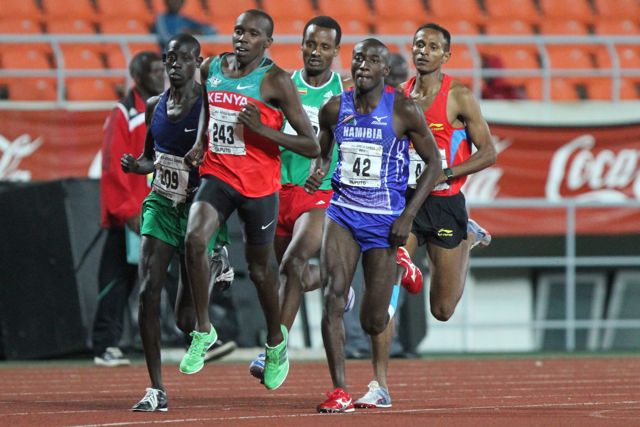Daniel Nghipandulwa is not just any athlete, he is the man who bettered Lazarus Kapolo’s long-standing record of 1:46,80 in the 800m, set in 1981.
Born at Oshikuku village in the Omusati region, Nghipandulwa bettered Kapolo’s 15-year record in 2011 during the Yellow Page South African Championships at the Moses Mabhida Stadium in Durban, in an impressive time of 1:46,62.
The middle-distance runner was raised by his grandmother after his mother died just four days after giving birth to him.
He started running while at Onamahoka Combined School in 2005, and mentions the 400m, 800m, 1 500m and 5 000m as his most preferred distances growing up, while he prefers to run the 800m in continental and international events.
“I was a very fierce competitor before my injury that needed surgery. Sport is not really only about winning but it has two facets – winning and losing. I was not the type of athlete who would only strive to win and cut myself off when I lose,” he says.
“I am still a registered member of Welwitschia 77 Athletics Club and I am coached by the masterful Letu Hamhola, who is not only a coach but a mentor to me as well. My priority right now is to return to full fitness and qualify for next year’s Olympic Games in France.”
The runner was spotted by coach Hamhola in 2008 at the age of 17, while representing Namibia during the Confederation of School Sport Associations of Southern Africa Championships.
Nghipandulwa says he will forever be indebted to coaches Hamhola and Agnes Samaria for the important roles they played during his early years, before he went on to set the national 800m record holder.
“Coaches Hamhola and Samaria really helped shape me into the record-breaking athlete I became. I should also not forget the motivational role Frank Fredericks played throughout my years as an athlete. We really have good people in this country,” he says.
“However, I can’t say the same about Athletics Namibia and government officials because they are never really there for the athletes. They will never come to you when you are preparing to go to a race but they will be the first to welcome you at the airport when you win.”
He says when he came to Windhoek, Hamhola, who became both a coach and a parent figure to him, invested a lot of his time on him and he even took him to compete in competitions in Botswana, South Africa and Europe.
The outspoken athlete, who represented the country at two All-Africa Games and one International Amateur Athletic Federation (IAAF) World Championships, says Namibian sports need a serious financial injection from the government so that athletes can prepare properly for big events.
He says it is a big shame that football, which is the national code of the country, does not even have a stadium fit to host international matches.
“Where is our national pride and dignity as a nation? How on earth is a mineral rich country like ours not able to build stadiums around the country? I wonder what the government’s priorities are because even their infrastructure is falling apart.”
Nghipandulwa says only those with the best interest at heart should lead sports, not politicians who are only concerned with filling their own stomachs.
“Being a sportsperson in Namibia doesn’t have any incentives apart from when you go out of the country and win a race. People with a sports history are appointed to be in charge of our sports people, which is a very abnormal set-up,” Nghipandulwa says.
“Is it really fair that we don’t have a stadium to host Fifa matches or a stadium to host IAAF competitions but we have stadiums to host political events? Namibian leaders need to change and think about the athletes.”

He also decries the fact there are no rewards for athletes who break national records while other countries under the IAAF reward athletes who set new records as an incentive for their achievements.
Nghipandulwa, an unmarried father of five, is currently employed by the Ministry of Home Affairs, Immigration, Safety and Security in the Namibian Police. He is also an astute businessman.
The national record holder, who also played football in the wing-back position while growing up, registered his company – Mutianyu Wall Investment cc in 2018 and Helen’s Pub, which he operates from his own private property. He is also a part-time goat farmer.
“Mutianyu is a company that is providing all the needs in our society, including school uniforms, and I am currently employing 15 workers for that purpose. Helen’s Pub is a place where your stress will disappear once you have entered inside,” Nghipandulwa says.
“Besides trying my luck as a young entrepreneur, I have also established Kakadhinwa Athletics Club, which is already registered with Athletics Namibia. My aim is to train young athletes after retirement in order to have more athletes compete at regional level.”
He regrets not taking up an offer to run in Europe, “like the Kenyans, Ethiopians and some athletes from West Africa are doing” and believes Namibia does not consider the needs of its athletes.
“Our loyalty to our country is not reciprocated by the powers that be. Looking at how the other athletes who have adopted new countries are living, you feel like kicking yourself,” he says.

Nghipandulwa says one day it will be difficult to convince young people to participate in sport because even he, who is a national record holder, doesn’t live like the champion, apart from the money he generates from his own personal hustle.
“Our administrators at Athletics Namibia and in the directorate of sport must start doing things in a better way. Today, you find yourself in a position where you can just be told that you will go compete in an event in South Africa or Botswana. You will be expected to go compete and beat people who have been in camp for three to six months, which is not fair at all. They will expect you to go win and if you don’t, there will be no welcoming party for you at the airport.
“We are administered by incompetent people.”
Nghipandulwa was a founding member of Athletics Namibia’s Athletes Commission, founded in 2011.
In advising young runners, Nghipandulwa says sport is good for your own personal health and also requires you to refrain from substance abuse and to be disciplined.



Leave a Reply